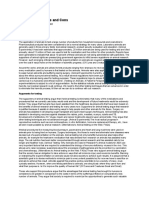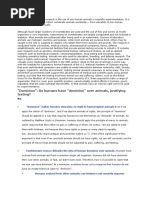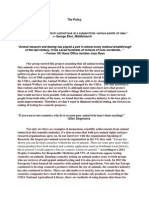Henrietta Lacks Essay PDF
Henrietta Lacks Essay PDF
Uploaded by
api-302403778Copyright:
Available Formats
Henrietta Lacks Essay PDF
Henrietta Lacks Essay PDF
Uploaded by
api-302403778Original Title
Copyright
Available Formats
Share this document
Did you find this document useful?
Is this content inappropriate?
Copyright:
Available Formats
Henrietta Lacks Essay PDF
Henrietta Lacks Essay PDF
Uploaded by
api-302403778Copyright:
Available Formats
HEAD: Henrietta Lacks Essay
Dorsey !1
Abstract
!
This essay will shed some light on the injustices behind animal testing and what has been
done to advocate for unethical situations regarding experimentation. Drug and cosmetic
companies have been experimenting on animals for many years, and consumers have recently
been paying more attention to the harm actually done to animals while running trials. This essay
will also talk about the correlation between testing on humans, such as Henrietta Lacks from The
Immortal Life of Henrietta Lacks by Rebecca Skloot, and what happens to animals. Every year,
an incredible amount of money from the government is spent on thousands of animals used in
drug and cosmetic trials in the United States. All over the world, consumers are realizing the
ethics behind treating lab animals and are demanding cruelty-free products. New science has
provided an alternative to live animal testing and is instead using live cells for the same
experiments.
!
!
!
!
!
!
!
!
!
!
!
!
!
!
!
running head: Henrietta Lacks Essay
Dorsey !2
Henrietta Lacks & Animal Testing
Every week, thousands of new drug and cosmetic products are flung into the sales market
to satisfy the need of consumers. Now, take a moment to think about the amount of products one
typically uses in a day. Face creams, body washes, deodorants, all went through some sort of
experimentation process to ensure that the product would be agreeable on your skin. This
experimentation process is done in labs, unfortunately with the help of animals, unless stated as
cruelty free. As stated in Nature Medical, Each chemical that goes through the multiple tests
required for registration can use up to 5,000 animals, or 12,000 if the chemical is a pesticide. (p.
1, Abbot)
Now imagine you are Henrietta Lacks, living in the 1950s, suffering severely from a
cervical tumor. Doctors from the Johns Hopkins Hospital are assisting you with your condition,
are successfully able to remove only parts of the large tumor occupying part of your body.
Something comes up in the study of the tumor; the cells from the cancerous tumor removed from
your cervix are reproducing! Doctors are puzzled and astonished from the reproducing cancer
cells and run many tests. Your cells become known as HeLa cells, and are sent off to hundreds of
hospitals for other labs to run tests of their own. In The Immortal Life of Henrietta Lacks by
Rebecca Skloot, the ethics behind human and animal research is questioned and brought to light.
For many years, in vivo testing has been the method of choice when testing products,
which means the experiments are conducted on live beings. Many people have expressed their
opinions on live animal testing due to the cruelty normally associated with it. People for the
Ethical Treatment of Animals (PETA) is a large nonprofit corporation advocating for the rights of
animals who have been extremely proactive in the testing of animals by cosmetic and
running head: Henrietta Lacks Essay
Dorsey !3
pharmaceutical companies. Apart from purely animal testing, experimentation on humans has
also been done to test certain products. Controversy arises behind the ethics of testing on both
humans and animals. An example of where animal testing became preferred is a time when
thalidomide was given to pregnant women to control morning sickness, but it caused horrible
birth defects. Because of this, governments were highly sensitive to public concerns and
called on their authorities to develop animal-based tests (p. 1, Abbot) The life and ethics of both
came into question when the government was suddenly asked to decide between the lives of
humans or the lives of animals. Human life became the priority and years of testing on animals
followed. Activists such as PETA and highly motivated citizens brought to light the horrible
treatment of animals in the experimentation facilities and asked for a call to action.
Studies have been done to see how crucial animal testing really is, and to draw pros and
cons of either side. A couple of statistics to support the unfairness behind animal testing begins
with how effective the tests truly are. To test a chemical for its potential to cause cancer takes
five years and involves 400 rats. More than 50% of the results are positive, of which 90% are
false positives. (p. 1, Abbott) A sad reality in these tests are that most animal tests over or
underestimate toxicity, or simply don't mirror toxicity in humans very well (p.1, Abbot).
Because of the rise in dissatisfaction from the public, a form of testing became more popular,
called in vitro testing. This method focuses on experimenting on partial or dead organisms, most
usually in regards to testing cells on a petri dish. The benefits of in vitro testing are economically
more cost efficient, because the cost of the animals goes down since the cells are only being used
for experimental testing (Nature Medicine, Dolgin) . Ethically, this method is more agreeable to
the public and has been receiving more support In fact, In Canada, Research Ethics Boards
running head: Henrietta Lacks Essay
Dorsey !4
(REBs) have the power to refute or revoke finding for experiments that do not meet ethical
requirements. (Health Law, Tremayne-Lloyd & Srebrolow) The high demand for ethically
treating animals during testing phases has impacted the way Canada has run its research on
products. With more and more consumers in the United States addressing this animal rights
concern, companies are slowly progressing towards a cruelty-free alternative during the
experimentation process.
In the case of Henrietta Lacks, her cells were taken from her and unknowingly used in
hundreds of scientific experimentations in labs across the entire world. The Lacks family
received no monetary compensation for the successes belonging to HeLa cells used in drug and
vaccine trials, and was unaware of such experimentation for years. The ethics behind whether or
not it was correct to use Henrietta Lacks cells for testing came into question and also shed light
on animal rights.
It has always been a firm belief of mine to advocate for those who do not have the
necessary resources to advocate for themselves. I also believe that no one (or nothing) should be
forced or manipulated into a situation they do not fully understand. When it comes down to it, I
would rather risk the life of an animal to save the life of a human since I understand that there are
risks and casualties that come along with experimentation. I do however know that there is
generally an alternate approach to testing on animals, especially since they expect us to be their
voice. The more PETA and other organizations demand action in the way companies run their
drug and cosmetic trials, the more light gets shed on this injustice. As a society we are expected
to stand up for the voiceless, human and nonhuman, and the more attention this subject gets, the
more awareness we can bring to our peers.
running head: Henrietta Lacks Essay
Dorsey !5
References
Dolgin, Ellie, (2010). News, Nature Medical. Animal testing alternatives come alive in
US, Volume 16, Number 12.
Abbott, Alison, (2005). News, Nature Medical. More than a cosmetic change,
Volume 438.
Tremayne-Lloyd, Tracy & Srebrolow, Dr. Gary, (2007). Health Law, Research Ethics
Approval for Human, Volume 51.
Skloot, Rebecca, (2010-2011). The Immortal Life of Henrietta Lacks, New York, Crown
Publishing Group
You might also like
- Yakama Rising PDFDocument18 pagesYakama Rising PDFapi-30240377867% (3)
- Right On! 4: - Test 4ADocument5 pagesRight On! 4: - Test 4Acorina2vancea100% (1)
- Animal Testing Persuasive EssayDocument5 pagesAnimal Testing Persuasive Essayapi-2538868140% (1)
- Presentation MGTDocument14 pagesPresentation MGTnur_azian_6No ratings yet
- Longchen NyingthigDocument53 pagesLongchen NyingthigSherab Sengye100% (4)
- Roald Dahl Charlie and The Chocolate Factory Extra Reading Comprehension Exercises Writing Creative W - 83542Document4 pagesRoald Dahl Charlie and The Chocolate Factory Extra Reading Comprehension Exercises Writing Creative W - 83542Kevin BarretoNo ratings yet
- Tugas Akhir Bahasa Inggris: Essay 2000 KataDocument5 pagesTugas Akhir Bahasa Inggris: Essay 2000 KataHans Santosa PurnamaNo ratings yet
- Animal Testing Pros and ConsDocument6 pagesAnimal Testing Pros and ConsMalika SadridinovaNo ratings yet
- Animal Testing: Pros and ConsDocument11 pagesAnimal Testing: Pros and ConsabhishekjainitNo ratings yet
- Research PaperDocument6 pagesResearch Paperapi-273334171No ratings yet
- English FinalDocument12 pagesEnglish Finalapi-466408458No ratings yet
- Animal Testing Should Be Banned Thesis StatementDocument6 pagesAnimal Testing Should Be Banned Thesis Statementaflpbpcnhjpwkd100% (2)
- CommrepDocument9 pagesCommrepapi-273318053No ratings yet
- Animal Testing Case StudyDocument9 pagesAnimal Testing Case StudydbafojwlfNo ratings yet
- Global Perspectives PaperDocument9 pagesGlobal Perspectives Paperapi-373229634No ratings yet
- Thesis Statement On Pro Animal TestingDocument7 pagesThesis Statement On Pro Animal Testingdianaolivanewyork100% (2)
- Vega - Vicente Position PaperDocument4 pagesVega - Vicente Position PapervalshkaNo ratings yet
- Animal Testing Literature ReviewDocument12 pagesAnimal Testing Literature Reviewapi-34135015550% (4)
- Thesis Statement Supporting Animal TestingDocument8 pagesThesis Statement Supporting Animal Testingdnqjxbz2100% (2)
- Should Animals Be Used For Scientific ResearchDocument8 pagesShould Animals Be Used For Scientific ResearchNajah HalidNo ratings yet
- Debate Log - Pros To Animal TestingDocument4 pagesDebate Log - Pros To Animal Testingapi-754850372No ratings yet
- Longer Research Argument EssayDocument7 pagesLonger Research Argument EssaySup YowNo ratings yet
- Thesis Statement On Why Animal Testing Is WrongDocument6 pagesThesis Statement On Why Animal Testing Is Wrongohbmogxff100% (1)
- Animal Testing, Against Animal Testing.Document5 pagesAnimal Testing, Against Animal Testing.F.W.100% (3)
- Kendrick Acosta Amillano - 12 - Argument Essay On Animal TestingDocument3 pagesKendrick Acosta Amillano - 12 - Argument Essay On Animal TestingKendrick a.amillanoNo ratings yet
- Animal Testing ConsDocument4 pagesAnimal Testing ConsBrandon AttardiNo ratings yet
- Argumentative EssayDocument9 pagesArgumentative Essayapi-412321892No ratings yet
- Testing Drug On Animals Is The Sacrifice We MakeDocument6 pagesTesting Drug On Animals Is The Sacrifice We MakeJessa SiaresNo ratings yet
- Animal Testing ProsDocument6 pagesAnimal Testing ProsShalini KanganNo ratings yet
- Lit ReviewDocument11 pagesLit Reviewapi-264403568No ratings yet
- Annotatedbibliography 1Document5 pagesAnnotatedbibliography 1api-338770882No ratings yet
- Animal TestingpaperDocument17 pagesAnimal Testingpaperapi-270493670No ratings yet
- Example Thesis Statement For Animal TestingDocument5 pagesExample Thesis Statement For Animal Testinggja8e2sv100% (1)
- Animal Testing Thesis Statement AgainstDocument7 pagesAnimal Testing Thesis Statement Againstyolandajenkinsjackson100% (1)
- Animal TestingDocument4 pagesAnimal Testingapi-344188858No ratings yet
- Final Draft Animal 2Document5 pagesFinal Draft Animal 2api-318176187No ratings yet
- Animal Testing: Pros and ConsDocument5 pagesAnimal Testing: Pros and ConsSheryl UrieNo ratings yet
- Argumentative EssayDocument7 pagesArgumentative EssayJavon ColemanNo ratings yet
- Logical Argument: Christopher Hutson Composition II Gail RichardDocument4 pagesLogical Argument: Christopher Hutson Composition II Gail Richardapi-302072203No ratings yet
- Exploratory EssayDocument8 pagesExploratory EssayTaylor MartinelliNo ratings yet
- Don't Have The Wool Pulled Over Your Eyes: Humane Society of The United States As Their Stated GoalDocument4 pagesDon't Have The Wool Pulled Over Your Eyes: Humane Society of The United States As Their Stated GoalMariana FelippeNo ratings yet
- Animal Testing Far AhDocument6 pagesAnimal Testing Far AhVonderNo ratings yet
- Literature ReviewDocument5 pagesLiterature Reviewapi-550531643No ratings yet
- Animal Testing or Animal Research Is The Use of NonDocument4 pagesAnimal Testing or Animal Research Is The Use of Nonalexis_hoNo ratings yet
- Mykyta Skalyga Mini Lit ReviewDocument2 pagesMykyta Skalyga Mini Lit ReviewiliminattionNo ratings yet
- Animal Testing Should Be Banned Completely - A Heart-Wrecking SituationDocument6 pagesAnimal Testing Should Be Banned Completely - A Heart-Wrecking Situationthathsi2020No ratings yet
- Final Paper - Rayna FenstermacherDocument5 pagesFinal Paper - Rayna Fenstermacherapi-547468673No ratings yet
- Animal Cruelty PaperDocument10 pagesAnimal Cruelty Paperapi-597580094No ratings yet
- InjusticeresearchpaperanimaltestingDocument6 pagesInjusticeresearchpaperanimaltestingapi-358936649100% (1)
- Safari - 15 Jul 2022 at 9:20 AMDocument1 pageSafari - 15 Jul 2022 at 9:20 AM25Ng Ee Oon黄圆韵No ratings yet
- Example of Argumentative EssayDocument2 pagesExample of Argumentative EssayIftika Rahmi Fahrun NissaNo ratings yet
- Animal Testing Speech/EssayDocument3 pagesAnimal Testing Speech/EssayJames1K2No ratings yet
- Critical Thinking PaperDocument12 pagesCritical Thinking PaperVirginiaNo ratings yet
- Animal TestingDocument4 pagesAnimal TestingCristea RalucaNo ratings yet
- Thesis Statement Against Animal TestingDocument5 pagesThesis Statement Against Animal TestingNeedSomeoneToWriteMyPaperForMeSingapore100% (2)
- A Sample Opinion Essay (For & Against) " Should Animals Be Used in Testing New Drugs and Procedures?" Animal TestingDocument1 pageA Sample Opinion Essay (For & Against) " Should Animals Be Used in Testing New Drugs and Procedures?" Animal TestingM.Barbaros DuzgunNo ratings yet
- Argument Paper MC Johnson - Animal TestingDocument8 pagesArgument Paper MC Johnson - Animal Testingapi-469611087No ratings yet
- Animal Testing (CAT 3) UpdatedDocument2 pagesAnimal Testing (CAT 3) Updatedbunnysoobin33No ratings yet
- Animals Should Not Be Used As A Laboratory ToolsDocument6 pagesAnimals Should Not Be Used As A Laboratory ToolsLuisa Castillo100% (1)
- English Argumentative Research Animal Testing Should Be BannedDocument11 pagesEnglish Argumentative Research Animal Testing Should Be BannedhasalcedoNo ratings yet
- I Am a Doctor, My 3 Wives Died from Cancer: I Learned About the Truth of Conventional and Alternative TreatmentsFrom EverandI Am a Doctor, My 3 Wives Died from Cancer: I Learned About the Truth of Conventional and Alternative TreatmentsRating: 5 out of 5 stars5/5 (1)
- Who Goes First?: The Story of Self-Experimentation in MedicineFrom EverandWho Goes First?: The Story of Self-Experimentation in MedicineNo ratings yet
- Cardiac Arrest Report Assignment Instructions PDFDocument2 pagesCardiac Arrest Report Assignment Instructions PDFapi-302403778No ratings yet
- Spring Refl EssayDocument2 pagesSpring Refl Essayapi-302403778No ratings yet
- E-Portfolio Fall Term Assignment InstructionsDocument1 pageE-Portfolio Fall Term Assignment Instructionsapi-302403778No ratings yet
- This Content Downloaded From 81.66.178.62 On Thu, 01 Sep 2022 22:44:00 UTCDocument9 pagesThis Content Downloaded From 81.66.178.62 On Thu, 01 Sep 2022 22:44:00 UTCe GNo ratings yet
- Mazuri 5E5L StudyDocument9 pagesMazuri 5E5L StudyLawrence TancincoNo ratings yet
- nts330 W15finalproject StardotstarDocument21 pagesnts330 W15finalproject Stardotstarapi-374835421No ratings yet
- 2015 Module 2 PPT 1Document65 pages2015 Module 2 PPT 1Tengku Ahmad HakimiNo ratings yet
- Data Collection & Questionnaire DesigningDocument24 pagesData Collection & Questionnaire DesigningDr. V. Vaidehi PriyalNo ratings yet
- Nurture Your RelationshipDocument2 pagesNurture Your RelationshipMary Biscocho100% (1)
- Group 3 Non InstitutionalDocument13 pagesGroup 3 Non InstitutionalKaila EspirituNo ratings yet
- Data Mining: Concepts and TechniquesDocument59 pagesData Mining: Concepts and TechniquesdivyaNo ratings yet
- Design and Implementation of An Intruder Detector in Homes With Audio and Sms Alert Using GSM ModuleDocument65 pagesDesign and Implementation of An Intruder Detector in Homes With Audio and Sms Alert Using GSM ModuleLANGATNo ratings yet
- International Protection of TrademarksDocument18 pagesInternational Protection of TrademarksArunaMLNo ratings yet
- Umi's 2023-Drawstring Bag Self-EvaluationDocument2 pagesUmi's 2023-Drawstring Bag Self-EvaluationMU - 11BP 1004050 Erindale SSNo ratings yet
- Goal Achiever PackDocument16 pagesGoal Achiever Packisahu.shubhamNo ratings yet
- Other PoisionDocument6 pagesOther PoisionNitya SharmaNo ratings yet
- Continuing GuaranteeDocument13 pagesContinuing GuaranteeKarthik RickyNo ratings yet
- Cognitve Behavioral Therapy Training in Core Skills Presentation NASBHCDocument41 pagesCognitve Behavioral Therapy Training in Core Skills Presentation NASBHCNadiaNo ratings yet
- Zen & Tea: Lobal EA UTDocument48 pagesZen & Tea: Lobal EA UTHoàng Như NguyễnNo ratings yet
- SunSpec Modbus Interface ManualDocument20 pagesSunSpec Modbus Interface Manualardhipria100% (1)
- UPCAT Physics Review Part 2Document37 pagesUPCAT Physics Review Part 2Clarise VicenteNo ratings yet
- CATCH UP FRIDAY TEACHERS GUIDE Respect Intercultural Understanding Grade 4Document3 pagesCATCH UP FRIDAY TEACHERS GUIDE Respect Intercultural Understanding Grade 4mary.loremiaNo ratings yet
- Workplace CommunicationDocument6 pagesWorkplace Communicationnewton dominguezNo ratings yet
- 623Document304 pages623mylan_ScribdNo ratings yet
- Five Ways To Kill A Man THEME AND ANALYSISDocument5 pagesFive Ways To Kill A Man THEME AND ANALYSISVishrut Bls100% (1)
- Table 7-13 Antidepressants For Geriatric PatientsDocument2 pagesTable 7-13 Antidepressants For Geriatric PatientsDragutin PetrićNo ratings yet
- Yamuna River-2Document2 pagesYamuna River-2Munnur PandariNo ratings yet
- Solid AngleDocument9 pagesSolid AngleDimitrios Christos SarvanisNo ratings yet




























































































